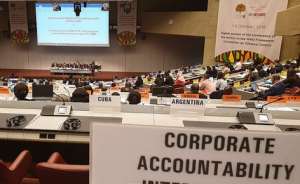
In 2020, an overwhelming 13 million Ghanaians demonstrated their democratic power by voting, marking a staggering 79% voter turnout. A slim majority of 51.3% cast their ballots for the NPP, while 47.4% supported the NDC, leaving a scant 1% for minor parties. Projections for 2024 anticipate a similar turnout of approximately 14.22 million voters, a testament to the enduring civic engagement of the Ghanaian populace.
This robust participation embodies the electorate's potential to demand accountability and dictate the governance of the nation. Regrettably, the political landscape remains dominated by two major parties, with many voters casting ballots out of tradition rather than expectation of change. This is starkly evident in regions like Volta and Ashanti, where voting patterns are predictably partisan, devoid of tangible benefits or democratic dividends.
The consequences of such entrenched partisanship are dire. Since the reinstatement of democracy in 1993, Ghana's development has crawled at an excruciatingly slow pace. The nation grapples with persistent low-income levels, a housing crisis, and rampant unemployment among its youth. The private sector, crippled by weak economic fundamentals, flounders as businesses falter under the strain of a depreciating exchange rate.
Amidst these challenges, corrupt practices and weak institutions thrive, with the media failing in its critical role to restore order and champion the common good. Politics has suffocated the potential of our nation, enriching a select few while the vast majority endure abysmal living conditions. Our leaders, once in power, reveal their true colours - untrustworthy and self-serving. They prioritize their cronies, rewarding party loyalists at the expense of national progress, leading to a cycle of stagnation and regression.
As we face another election year, the eloquent promises of political leaders echo hollow. The critical question remains: are their intentions genuinely for the betterment of Ghana, or merely to benefit themselves and their close associates?
As citizens, the responsibility lies with us to break this cycle. We must rise above partisan loyalties and vote for leaders who truly have Ghana's best interests at heart, those committed to genuine progress and improving the plight of the masses. It is time to demand more than empty promises—we must seek, support, and elect leaders capable of real change.
Isaac Ofori
Human Rights Advocate
BA, MA, MPhil, PhD Student (UEW, SCMS)




 Western North been sidelined for far too long; address our needs before 2024 ele...
Western North been sidelined for far too long; address our needs before 2024 ele...
 Effutu: 'Stop eating at night and take care of your health' — Afenyo Markin advi...
Effutu: 'Stop eating at night and take care of your health' — Afenyo Markin advi...
 Akufo-Addo's desperate attempt to disrupt Yagbonwura's 1st year anniversary cele...
Akufo-Addo's desperate attempt to disrupt Yagbonwura's 1st year anniversary cele...
 Armed robbers attack, rob Sethi Brothers Ghana Limited in Tema
Armed robbers attack, rob Sethi Brothers Ghana Limited in Tema
 SML deal: We commend Manasseh for holding gov't to account, Akufo-Addo for not s...
SML deal: We commend Manasseh for holding gov't to account, Akufo-Addo for not s...
 Our recall invocation is in good faith to consider three key issues – Majority
Our recall invocation is in good faith to consider three key issues – Majority
 You’re inviting bad luck upon yourself if you use Indian hair — Spiritualist war...
You’re inviting bad luck upon yourself if you use Indian hair — Spiritualist war...
 Ejisu by-election: Police questions Kwadaso MP, two others over bribery allegati...
Ejisu by-election: Police questions Kwadaso MP, two others over bribery allegati...
 Nana Kwame Bediako is Nkrumah’s reincarnate; he’ll be president if he appoints N...
Nana Kwame Bediako is Nkrumah’s reincarnate; he’ll be president if he appoints N...
 Dumsor: Mahama gave us ‘dum, dum, dum’ but we are now in the era of ‘dum sie sie...
Dumsor: Mahama gave us ‘dum, dum, dum’ but we are now in the era of ‘dum sie sie...
